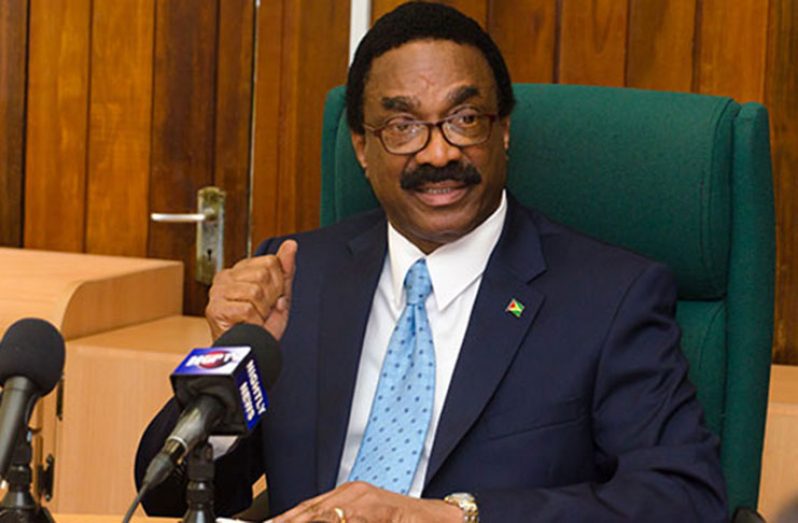…AG says administration must remain to ensure Guyana doesn’t go rogue
By Lisa Hamilton
THE government, in its “interim” status until the holding of new elections, has not been mandated to “down all tools” but to continue its governance of the country which, at any time, can come under grave threat.
On Wednesday on 94.1 FM programme, Hot Seat with Stan Gouveia, Attorney General Basil Williams explained that while it is agreed that during this period it will not be “business as usual”, the powers of the government remain. In other words, the government can continue on projects started and facilitate the smooth flow of other operations but will act with the knowledge that “controversial contracts” ought not to be embarked upon.
While the opposition has been calling for the government to cease all operations apart from the facilitating new elections, the Caribbean Court of Justice (CCJ), Guyana’s highest appellate court, on July 12, referred all parties in the matter to Article 106 (7) of the Constitution.
The section states that notwithstanding its defeat, the government must remain in office, and hold an election within three months, or during an extended period approved by two-thirds of the National Assembly.
The AG stated that since the CCJ’s final decision, the government has been very upfront about its status as an “interim government” and has no intention to act otherwise. “With an interim government, the ministers retain their powers; the panoply of powers that they have. It’s not business as usual. We do not want to hide things; we know that it’s not business as usual. But, the powers remain, you have to continue to govern the country and in matters of policy, expenditure and appointments,” Williams stated.
Indeed, a release from the Ministry of the Presidency on July 13 indicated that the government will comply with the orders issued by the CCJ during the ‘interim’ period and will “restrain the exercise of its legal authority”. The statement explained that while the government will continue its routine management of the country, it will also address urgent issues that are in the public interest.
The Attorney General also explained further the current limitations of the government. “We know some of the restraints which include: we should be limiting ourselves to routine matters and matters that are non-controversial; matters that would probably get the consent of the opposition and decisions which would be easy for a new government to change or adjust without much cost or disruption,” Williams stated.
CAN’T GIVEAWAY OIL BLOCKS
He was then questioned on how this compares with the 2014 occurrence whereby former People’s Progressive Party (PPP) President, Donald Ramotar, had prorogued Parliament in order to avoid facing a no-confidence motion brought against his government. The Attorney General said in response that the character difference between the two governments on the topic is clear but equally damming is the signing of major oil contracts by the former government during this period.
“Unlike the PPP, for example, you can’t give away oil blocks during this period; you can’t give away all those hectares of State lands and the like,” the AG pointed out.
The Ramotar-led administration is now under investigation for having awarded major oil blocks to “junior” oil companies just days before the 2015 General and Regional Elections.
Meanwhile, others have accused the party of massive prejudiced land giveaways just prior the period. That aside, the Attorney General stated that for the opposition or anyone to suggest that the government must relinquish its governance would be to carve open a portal for great chaos and unlawfulness.
Williams highlighted: “The President is quite clear on this matter that we are here on a changed mode and our obligation is to ensure that Guyana doesn’t go rogue; that we don’t give drug runners, ‘narco’ traffickers, trafficking in person, money launders and all of the types or any ideas that they can make a resurgence after all the work that we have done since we came into office.”
Just this year, the United States (US) commended Guyana for its headway in the Anti-Money Laundering (AML) front.
Meanwhile, Williams reminded that Guyana is still involved in a border controversy with neighbouring Venezuela and it is obvious that even without the CCJ’s decision, the government could not simply “down tools” and expect to later function in peace.
“If there’s a natural disaster what happens? The government has to deal with it. If there is any terroristic activity, the government has to deal with it,” he stated. “We have a border controversy and the government can’t down tools on that. We can’t say that we cannot deal with the issue if anything arises. We have a very long border with Venezuela and Brazil…so what are we supposed to do? Allow those submarines to come in will that narcotics? We have to continue governing.”




.png)









